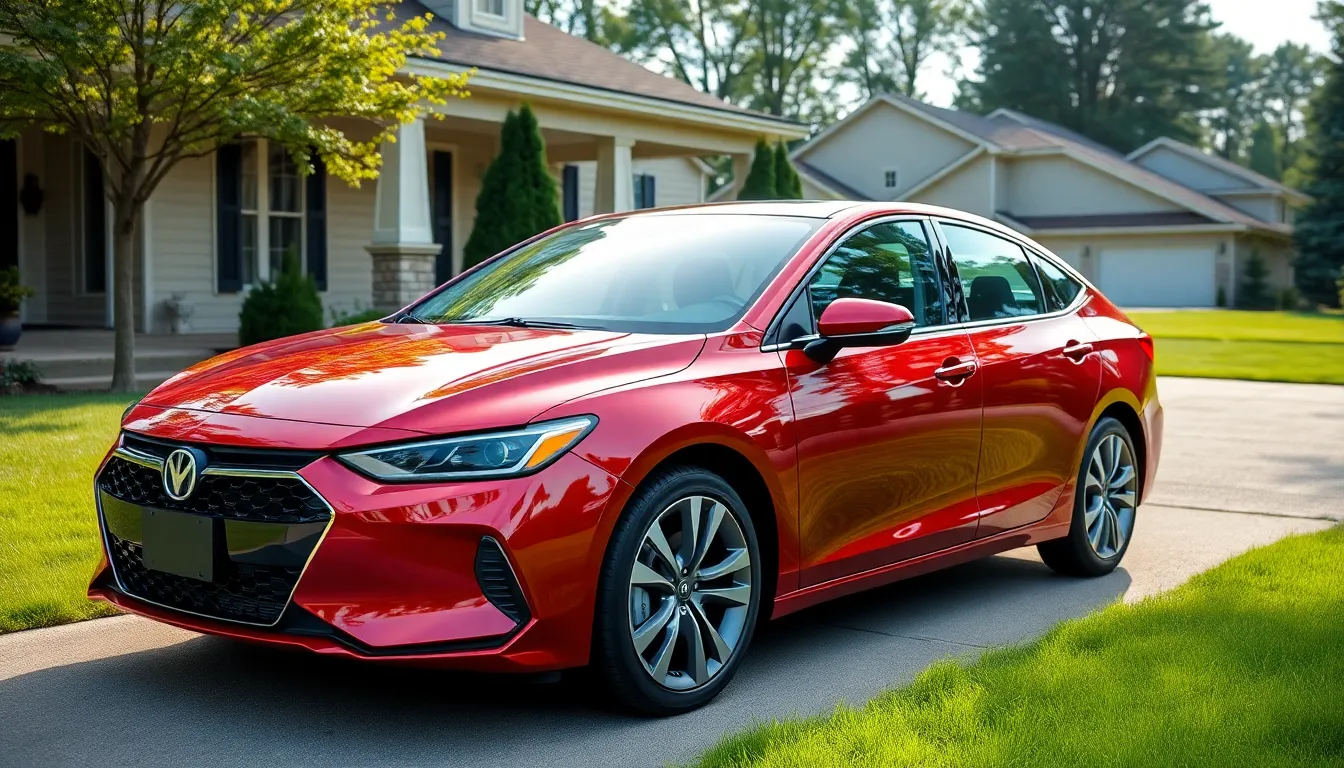Buying a new car can feel like stepping into a shiny new world of possibilities. Picture yourself cruising down the highway in a sleek ride, the wind in your hair and the latest tech at your fingertips. But before you trade in your old clunker for that gleaming new model, it’s crucial to weigh the pros and cons. After all, that sweet scent of a new car can sometimes mask the stench of a hefty price tag.
pros and cons of buying a new car
Buying a new car presents numerous perks, appealing to buyers seeking reliability and the latest features. Buyers often experience fewer maintenance concerns compared to used vehicles. Enhanced safety features become standard in many new models, contributing to increased peace of mind.
New cars typically come with factory warranties that cover a range of issues for several years. These warranties provide financial protection against unexpected repairs. Upgrades in technology, such as advanced infotainment systems, often make driving more enjoyable and convenient.
On the downside, purchasing a new vehicle can entail significant financial implications. Depreciation occurs quickly, with new cars losing approximately 20% to 30% of their value within the first few years. Higher initial costs and monthly payments may strain budgets, particularly for those opting for luxury models.
Buyers also face stress from navigating financing options, terms, and interest rates. The array of choices available can create overwhelm. Long-term commitments associated with loans may limit financial flexibility for other investments or necessities.
Evaluating the costs alongside the benefits leads to a more informed decision. Analyzing personal needs and financial situations helps clarify whether buying a new car aligns with individual goals. Understanding both pros and cons enables consumers to make choices that suit their lifestyles and preferences.
Pros of Buying a New Car

Buying a new car offers several benefits that can enhance the ownership experience. Modern vehicles present numerous advantages that improve reliability, safety, and personalization.
Reliability and Warranty Benefits
New cars come with factory warranties that cover repairs for a specified period or mileage, typically three to five years or 36,000 to 60,000 miles, whichever comes first. Such coverage provides peace of mind, minimizing out-of-pocket expenses for unexpected problems. Lower maintenance needs accompany new cars due to the presence of untarnished parts and updated technology. Customers enjoy fewer visits to the mechanic, which ensures routine maintenance remains manageable and predictable.
Advanced Safety Features
New vehicles incorporate the latest safety technologies, improving protection for drivers and passengers. Features like automatic emergency braking, lane-keeping assistance, and adaptive cruise control contribute to a safer driving experience. Advanced airbag systems and collision avoidance technologies also reduce the risk of injury during accidents. Enhanced crash-test ratings accompany many new models, reflecting their superior engineering and design.
Customization Options
New cars offer numerous customization options, allowing buyers to personalize their vehicles to suit their preferences. Options include color choices, interior materials, and popular accessories, enabling drivers to create a unique look. Many manufacturers provide programs that allow buyers to tailor features such as entertainment systems and advanced navigation tools. Personalized settings, including seat positions and driver profiles, enhance comfort and convenience for every journey.
Cons of Buying a New Car
Buying a new car carries several drawbacks that potential buyers must weigh carefully.
Depreciation Concerns
Depreciation significantly impacts the value of a new car. On average, new vehicles lose about 20% of their value within the first year, and up to 50% by the end of three years. Such rapid depreciation means that if a buyer decides to sell or trade in the vehicle early, they receive a lower return on investment. Considering this depreciation factor is crucial for those who plan frequent vehicle changes or drive limited distances. Buyers often find themselves underwater on loans due to this predicament, making it essential to assess personal ownership plans thoroughly.
Higher Initial Costs
Initial costs for a new car are a noteworthy consideration. New vehicles often come with price tags ranging from $20,000 to over $50,000, depending on the make and model. Higher purchase prices lead to larger down payments and higher monthly payments. Buyers must also factor in sales tax and registration fees that add to the total investment. Such expenses can strain budgets and limit financial flexibility, especially for first-time buyers or those with tight financial constraints. Evaluating financing options and potential interest rates becomes critical in determining overall affordability.
Maintenance and Insurance Expenses
Maintenance and insurance expenses for new cars can be surprising. Although factory warranties cover many repairs initially, basic maintenance costs still accrue over time. Oil changes, tire rotations, and general upkeep require budgeting beyond the purchase price. Insurance premiums generally run higher for new cars due to their increased value and advanced features. Buyers often face monthly costs that can range from a few hundred to several hundred dollars, depending on various factors. Understanding these ongoing expenses remains vital for making informed financial decisions.
Conclusion
Deciding whether to buy a new car involves weighing both benefits and drawbacks. The allure of modern features and warranties can be tempting but potential financial strains shouldn’t be overlooked. Buyers must consider depreciation and higher upfront costs alongside ongoing expenses.
Ultimately, it’s about finding the right balance between personal preferences and financial realities. By carefully assessing their needs and budget, consumers can make informed choices that align with their lifestyles. Whether the excitement of a new vehicle outweighs the financial implications is a personal decision that requires thoughtful consideration.

